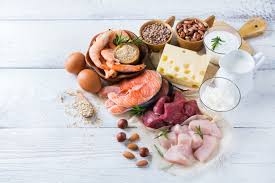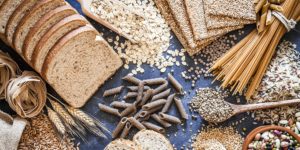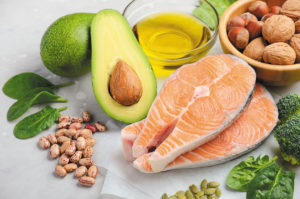By Samantha McCarthy, MS, RD/LDN
Spring is an exciting, beautiful, yet busy time of year for many. In the world of landscape and gardening design, it means a change from a more sedentary lifestyle all winter to a sudden increase in physical activity. This quick transition can be a challenge for the body but optimizing your nutrition throughout the Spring and Summer can help you feel better, increase energy levels, and prevent inflammation and pain in the joints.
Proper nutrition and fueling of the body are essential for a variety of reasons. The vitamins, minerals, and antioxidants present in healthy, whole foods provide our bodies with the nutrition it needs to properly fuel physical activity. It also helps prevent and lower inflammation which can cause aches and pains throughout the body, especially in your joints. Healthy eating will help improve energy levels throughout the day so you can avoid a “crash” and perform better on the job all day long. It will also help you sleep better at night, so you feel rested the following day.
To optimize nutrition and adequately fuel your active body, start by incorporating more whole foods into your daily routine. This includes: 
Fruits and Vegetables – these can be fresh or frozen. Choose a variety of colors of produce that will provide more antioxidants to help keep inflammation down in your body.
Lean proteins – examples: chicken, turkey, fish and shellfish, tofu, eggs, beans/legumes, nuts, seeds, and reduced-fat dairy products.
Whole Grains – look for foods made with 100% whole grains. This includes oatmeal, brown rice, 100% whole wheat bread, quinoa, farro, freekeh, wheat berries, whole-wheat pasta, bulgur, and whole-grain crackers.

Healthy Fats – fats shouldn’t be feared but instead embraced, as long as they are primarily unsaturated fats (AKA the “Healthy” Fats). Examples of healthy fats are foods like vegetable oils, avocadoes, nuts, seeds, and fish. Healthy Fats contain a higher amount of omega-3 fatty acids, which have been shown in research to help minimize and fight off inflammation in the body.

The foods above are what we call “nutrient-dense foods.” These foods provide calories, protein, carbohydrates, and fats that the body needs for energy and essential vitamins and minerals to optimize performance. You want to avoid “empty calorie foods,” which provide calories, but not much else. Examples of these foods include: processed, packaged foods like chips, cookies, crackers, energy bars, candy, chocolate, donuts, pastries, and other snack foods. Also, limit your consumption of fried foods from restaurants and fast-food establishments and quick convenient foods at gas stations and donut shops. These foods have been shown to increase inflammation in the body, which could cause you to have more aches and pains.
When choosing your meals and snacks, also consider the balance of your meal or snack. You should aim to get a lean protein, healthy fat, and high fiber carbohydrate source every time you eat. Properly balancing your meals and snacks will help keep you full and energized during the long days in the sun. Many processed snacks and convenience foods are high in sugar and carbohydrates. They will give a quick energy boost followed by a big crash in energy not long after. Consume an adequate and healthy breakfast to start your day off on the right foot; don’t skip it! Below are some examples of properly balanced meals and snacks:
- Meals:
- Protein + Vegetable + Whole Grain Carbohydrate
- Snacks:
- A piece of fresh fruit with a handful of nuts and seeds
- A handful of trail mix (nuts, seeds, dried fruit)
- Peanut butter on a banana or apple
- A slice of whole-grain bread with peanut butter
- Greek Yogurt with berries and walnuts
- Cottage Cheese with whole-grain crackers
- Hummus with fresh vegetables
- Bean Salad with whole-grain crackers
The importance of proper hydration is also key to being healthier overall. Long days in the heat and sun can easily lead to dehydration but choosing the wrong beverage can make you feel worse. Water should be the primary fluid. Aim to drink at least half your body weight in ounces of water per day (ex: if you weigh 200 lbs. You should drink at least 100 oz. of water). Sports drinks like Gatorade or Powerade are only necessary on very hot and humid days. Avoid sugary beverages like soda, juice, and flavored coffee drinks. If you struggle to drink enough fluids while on the job, drink in your off hours to make sure you go into your workday well hydrated. The easiest way to monitor if you are well-hydrated is by the color of your urine. More clear or pale-yellow urine means you are well-hydrated. Darker yellow and straw color urine means you are less hydrated.
Lastly, to ensure success in healthy eating during this busy time, plan and prepare ahead as much as possible. Pack a lunch bag the night before and include all the healthy snacks, meals, and fluids you will need to get through your day. On your days off, prep meals and snacks for the week so you don’t have to spend as much time at night preparing. Prepping ahead of time will help set you up for success to avoid ending up at the closest fast-food restaurant.
The importance of healthy eating cannot be overlooked for gardeners and landscapers. It is an extremely physical job that can put serious wear and tear on your body. Fueling your body with the right foods will help minimize this stress so you can stay healthy, energized, and pain-free many years into your career.
About the Author
 Samantha McCarthy has worked in the nutrition and fitness field for over ten years. She works at Cedardale Health and Fitness in Haverhill, MA, as the Director of Wellness and Group Exercise. She counsels a broad range of clients, specializing in weight loss, chronic disease prevention and management, and sports nutrition. Sam has a passion for helping others reach their health and wellness goals. She has a comprehensive approach to health, incorporating nutrition, exercise, stress management, and behavior change into her counseling.
Samantha McCarthy has worked in the nutrition and fitness field for over ten years. She works at Cedardale Health and Fitness in Haverhill, MA, as the Director of Wellness and Group Exercise. She counsels a broad range of clients, specializing in weight loss, chronic disease prevention and management, and sports nutrition. Sam has a passion for helping others reach their health and wellness goals. She has a comprehensive approach to health, incorporating nutrition, exercise, stress management, and behavior change into her counseling.
Sam received her bachelor’s degree in Nutritional Sciences from the University of Connecticut with a minor in nutrition for exercise and sport. While working in Boston as a dietitian and fitness professional, she received her master’s degree in nutrition and health promotion from Simmons College. In her free time, Sam enjoys cooking, gardening, reading, and spending time outdoors.
Contact Information
Samantha McCarthy, MS, RD/LDN
Registered Dietitian
Cedardale Health & Fitness
931 Boston Road, Haverhill, MA 01835
P: 978.373.1596 Ext. 121
E: smccarthy@cedardale-health.net
Each author appearing herein retains original copyright. Right to reproduce or disseminate all material herein, including to Columbia University Library’s CAUSEWAY Project, is otherwise reserved by ELA. Please contact ELA for permission to reprint.
Mention of products is not intended to constitute endorsement. Opinions expressed in this newsletter article do not necessarily represent those of ELA’s directors, staff, or members.

